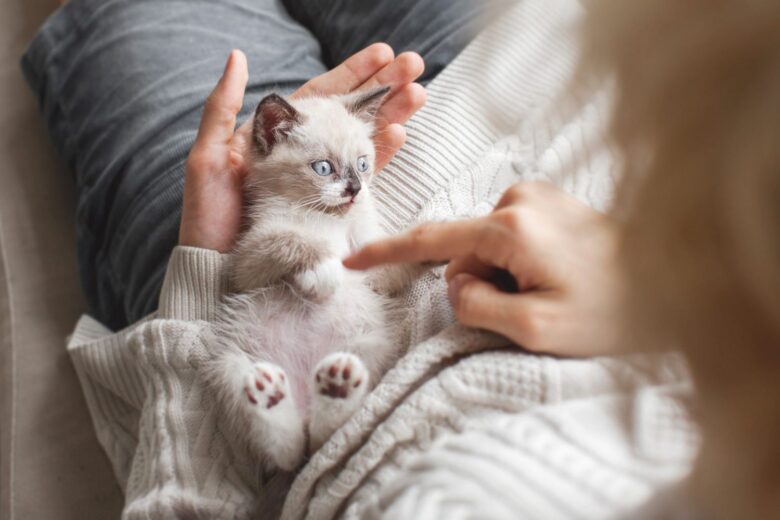Raising a new kitten can be both fun and difficult. You need to do a lot of planning and be committed to the kitten for the long term. With these ten tips, you can take good care of your kitten so that it grows into a healthy, happy cat.
1. Prepare Your Home:
Provide a safe and friendly place for your kitten before she arrives. To keep dangerous things, such as poisonous plants, away from kittens in the home, tighten any exposed wires and make sure kittens don’t have access to small things they could swallow. Provide a nice, quiet place where your kitten can feel safe and rest without being disturbed.
2. High-Quality Food:
Food is very important for a cat’s health and growth. Choose high-quality kitten food that is healthy and rich in important nutrients such as fats, vitamins, minerals and proteins. These nutrients aid in the growth and development of muscles, bones and organs. Talk to your vet about the best feeding plan for your kitten and how often he should be fed during the day.
3. Visit Your Vet Regularly:
It is important to get medical care regularly and early. As soon as you bring your kitten home, you should take her to the vet to check her health, start vaccinations and discuss deworming. Regular checkups allow you to monitor your child’s growth and development and address any health problems immediately. Vaccinations are the best way to keep your pet healthy, and your vet can also help you prevent wool and ticks.
4. Litter Training:
Most cats naturally go to the toilet on sand and quickly learn how to use a litter box. Show your kitten where the litter box is by placing it in a quiet and easily accessible place. Place them in the box and let them use them after meals and during play. Keep the litter box clean by scooping it daily and changing it regularly to encourage regular use.
5. Socialization and Handling:
Socialisation is very important for a kitten’s development. Gently pet your kitten every day to help it get used to people and become less fearful. To help them adapt better and become more social, place them in different environments with different people, pets and environments. Positive communication in the first few weeks can help your cat become well-behaved and friendly as an adult.
6. Have Fun and Exercise:
Playing is not only fun, it is also important for a kitten’s development. Give your kitten toys so he can do natural things like running, diving and climbing. Regular exercise and play with your pet is good for his health, keeps his mind sharp, and help you develop an emotional bond with him.
7. Grooming:
Start cleaning your kitten early so that she gets used to being touched and looked at. Grooming your dog regularly will check for skin problems and insects, prevent the formation of hairballs and keep his coat shiny and healthy. Start clipping nails and cleaning ears slowly and gently to make these tasks stress-free.
8. Sterilise Your Pet:
Talk to your vet about spaying or neutering your pet. Not only can these treatments prevent the birth of unwanted babies, but they also have health benefits, such as reducing the risk of certain cancers and stopping behavioural problems such as marking and wandering.
9. Create an Exciting Environment:
Your kitten thrives in exciting places. Provide a range of toys, scratching posts and climbing surfaces to satisfy their natural desires and keep them occupied. This variety keeps you from getting bored and underperforming, and supports a healthy and busy lifestyle.
10. Be Patient and Observant:
You will need to be patient as your kitten adjusts to its new home. As they get used to things, they may act shy, hidden, or angry during play. Pay close attention to their health and behaviour, and if you have any concerns, contact your vet immediately. By understanding your kitten’s needs and meeting those needs, you can bond with him and ensure his health.
Conclusion:
Adopting a kitten is a fun and fulfilling experience that can change someone’s life for the better. By following these important care tips and providing him with a loving and caring home, you can ensure that your baby grows into a healthy, happy, and well-adjusted cat. Remember, the time and energy you invest in your kitten’s early years will pay off in a lifetime of happiness and friendship.
FAQs:
1. How do I kitten-proof my house before I get a new kitten?
Keeping your kitten safe in your home means tying up any loose wires, removing any small objects your kitten may have swallowed, blocking any poisonous plants your kitten may have access to, and making sure there are no open windows or other things that your kitten has access to. The kitten may become stuck in dangerous locations or sustain injuries. It is important for his health that your kitten has a safe and comfortable environment.
2. What food should cats eat, and how often?
Kittens should be fed high-quality, balanced cat food that is rich in important nutrients such as proteins, fats, vitamins and minerals. Discuss with your vet what type of food your kitten needs and how much he needs, based on the kitten’s size, weight and health. Kittens typically need to be fed several small meals throughout the day to keep up with their rapid growth and development.
3. How long should I wait before taking my new kitten to the vet for the first time? What should I expect during my visit?
Once you bring your new kitten home, you should make an appointment with your vet for a full health check, vaccinations and deworming. Your vet will examine your kitten’s overall health, discuss preventive care with you, and give you advice on how to feed, care for, and behave with your kitten.
4. How can I teach my kitten to use the litter box properly?
As part of toilet training, cats are placed in the litter box after meals and naps and allowed to use the litter box. Place the litter box in a quiet and easily accessible place for your cat. If your kitten has an accident outside the litter box, gently lead him to the litter box without yelling or punishing him.
5. How can I get my new kitten to socialize and bond with other animals?
Socialization is very important for a kitten’s development. Slowly introduce them to different people, pets and household noises so they feel less anxious. Spend time playing, grooming and talking to your kitten to build trust and strengthen your bond. Wait a moment and let your kitten get used to its new home at its own pace.



